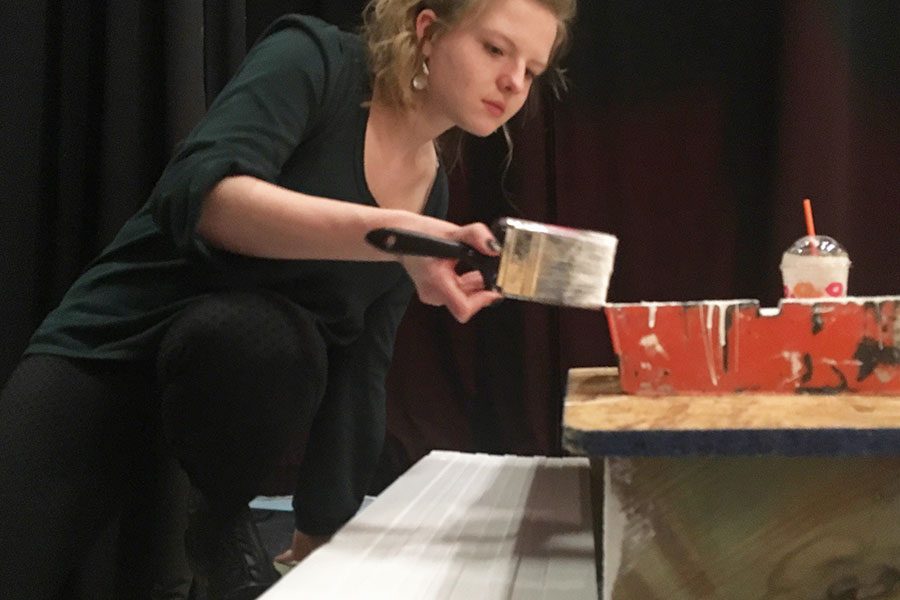The making of Mamma Mia: stage management
Stage manager Caroline Pack ‘19 paints steps for the set of Mamma Mia.
March 8, 2019
Putting together a successful musical production requires lots of moving parts, many of which aren’t quite as visible as the actors and singers right in the spotlight. Stage managers are one of them. These individuals help keep everything organized on stage, whether in rehearsals or performances, and pick up numerous jobs that could end up stacked onto the demands of the director.
Before the show is ready to be performed, stage managers help keep each rehearsal running smoothly and on time. They take attendance, keep track of missed lines, and record blocking notes for each scene so that each actor, dancer and singer knows when and where they need to be on stage. “They make sure everything stays super organized and everyone stays on task,” said Laurie Houvener ‘19, who is set to play Sophie in the musical.
On opening night, the role of stage management shifts. Though they aren’t taking notes and keeping track of missed lines anymore, they are still busy, running around to make sure every actor is on stage when they need to be, and all the set pieces and props are in the right places. “We have headsets on backstage and we keep the show running,” said, stage manager, Caroline Pack ‘19.
Mamma Mia brings its own specific challenges besides the regular workload for stage management. “Mamma Mia has been more complicated because there are a lot of moving parts and swiveling rooms and we’re going to be painting the floor of the stage, among other things,” said Pack. “It’s just a lot to keep track of in terms of the set.”
Stage management has proven to be a great way for students to get involved with theater when acting doesn’t appeal. “I always loved theater as a kid; however, I don’t like being on stage very much since it makes me really nervous,” said Pack. “I’m also a very organized person, so I can combine things that I’m good at to still do something I love and feel more comfortable.”
In order to become a stage manager, the directors hold interviews. They’re looking for students who are reliable, committed, able to manage others and comfortable communicating with the directors if any issues happen to arise. “[The musical] is just so many moving parts that we’re looking for really responsible young adults who are good in leadership roles and good at managing their peers without a superiority complex,” said Director Claire Pare and HBHS English teacher.
One of the biggest things that helps with becoming a stage manager is involvement with theater in other ways. Helping others from time to time, whether it’s with the sets, with lines or even just doing an odd job for the director are all great ways to make the first step into the world of theater and stage management.
Mamma Mia will be taking the stage at the HBHS auditorium on March 22, 23, 29 and 30, displaying the combined work of the stage managers as well as many other talented HB students.











![Students in Archaeology use tools in a mock excavation. As a class that focuses on hands-on learning, students are able to gain crucial life skills. “[The class] is more hands-on than I thought, and I'm learning way more with physical activities than I do in the classroom,” said student Tess Brown ‘25.](https://cavchronline.com/wp-content/uploads/2024/11/IMG_8390-e1733078359165-278x300.jpg)


